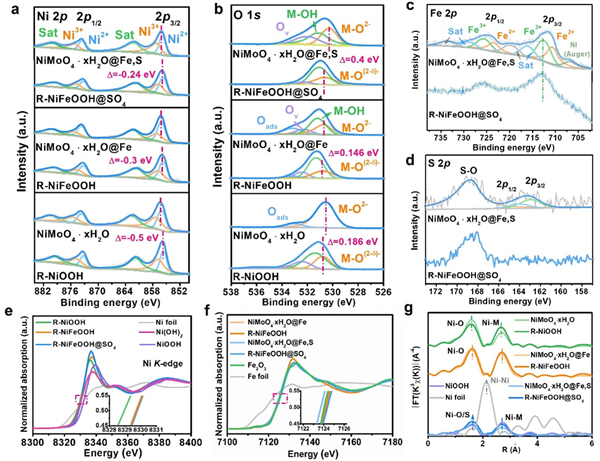- 武汉理工大学木士春Nat Commun:Fe,S共调制NiFeOOH催化剂的构建与氧析出反应
- 来源:木士春教授研究团队 个人网站 2024-10-06
电催化科研社 2024年10月06日 07:55 上海
研究背景
水分解产生氢气作为一种可持续的氢能源生产技术,已经引起了广泛的关注。然而,这一过程中的氧析出反应(OER)是限制其效率的关键因素,因为它涉及高能中间体的四个电子和四个质子的协同转移。目前的研究致力于开发高性能的OER催化剂,以提高反应效率和稳定性。
工作内容
本研究通过同时激活金属和晶格氧位点,构建了一个兼容的多机制催化剂R-NiFeOOH@SO4。该催化剂在碱性介质中表现出卓越的OER活性,能够驱动高达100/500mA cm-2的电流密度,并展现出超过300小时的稳定性。研究通过一系列的实验和表征手段,包括电化学测试、原位拉曼光谱、原位衰减全反射傅里叶变换红外光谱以及密度泛函理论计算,深入探讨了催化剂的结构和性能之间的关系。特别是,通过引入Fe和S作为调制剂,优化了Ni位点的电子结构,进而促进了OER过程中金属和晶格氧位点的协同氧化还原。
工作创新点
1.多机制兼容催化剂的设计:本研究成功地设计了一种能够同时利用金属和晶格氧位点进行OER的兼容多机制催化剂。
2.电子结构的优化:通过引入Fe和S作为调制剂,优化了NiMoO4?xH2O的电子结构,从而提高了OER活性。
3.长时间稳定性:R-NiFeOOH@SO4催化剂在碱性介质中表现出超过300小时的稳定性,这对于实际应用具有重要意义。
4.深入的机理研究:通过原位光谱和DFT计算,揭示了催化剂在OER过程中的结构变化和活性位点的动态行为。

Fig. 1 Preparation and structures of catalysts. a Synthetic route of nanocoral-like NiMoO4.xH2O@Fe,S, with the inset zoomed-in images presenting the surface structure evolution of the nanorods. FESEM, TEM, and High-resolution TEM images of b, f NiMoO4.xH2O, c, g NiMoO4.xH2O@Fe,S and d, e, h R-NiFeOOH@SO4. (The inset shows a magnified view, and the inset in Fig1. g is the corresponding selected area electron diffraction pattern). i HAADF-STEM image and corresponding EDS elemental mappings of Ni, Mo, O, Fe, S for R-NiFeOOH@SO4.

Fig. 2 Electronic and coordination structures of catalysts. High-resolution XPS of a Ni 2p, b O 1s, c Fe 2p, and d S 2p for obtained samples before and after CV activation. e Normalized Ni K-edge, f Fe K-edge XANES spectra of obtained samples and selected reference materials. The inset shows a magnified view of the selected area, x-axis: Energy (eV), y-axis: Normalized absorption (a.u.). g Fourier transformed k3χ(R) Ni K-edge spectra of obtained samples before and after CV activation.

Fig. 3 Electrocatalytic OER performance of catalysts. a OER Polarization curves with 80% iR compensation (The electrode working area is 0.5 cm × 0.5 cm, and the solution resistance used for compensation is approximately 2.3±0.2 Ω), and b corresponding overpotentials of catalysts at 100 and 500 mA cm-2 (The standard deviations were obtained through three reduplicative measurements in Supplementary Fig. 31). c Tafel plots of catalysts. d LSV curves before and after 3000 CV cycles, and e Chronoamperometry curves without iR compensation of R-NiFeOOH@SO4 in 1 M KOH at 0.65 and 0.85 V vs. Hg/HgO.
Fig. 4 Compatible with AEM-LOM OER catalysis analysis. a The relationship between the logarithm of current density of catalysts at the potential of 1.7 V versus RHE and pH. b OER Polarization curves of catalysts in 1 M KOH and 1 M TMAOH, respectively, without iR compensation. c Detected DEMS signals without any correction or subtraction of 16O16O, 16O18O and 18O18O for R-NiFeOOH@SO4 relative to time and corresponding LSV curves, no iR compensation. In-situ Raman spectra of 18O-labelled d R-NiOOH, e R-NiFeOOH and f R-NiFeOOH@SO4 measured at 1.624 V vs RHE in 0.1 M KOH with H216O. The Raman spectra of the 16O labeled sample is placed on the top for comparative analysis. In situ ATR-IR spectra of g R-NiOOH, h R-NiFeOOH, i R-NiFeOOH@SO4.

Fig. 5 DFT calculation analysis. a Projected density of states, b Schematic band diagrams (UHB: upper Hubbard band, LHB: lower Hubbard band) and c COHP of the Ni-O bond. Gibbs free energy diagrams of the AEM pathway on d Ni sites and e Fe sites, and f LOM pathway. g The energy barrier of RDS for AEM and LOM. Above data are based on NiOOH, NiFeOOH and NiFeOOH-SO4. h Schematic illustration of the AEM and LOM pathway on NiFeOOH@SO4.
原文信息
Luo, X., Zhao, H., Tan, X. et al. Fe-S dually modulated adsorbate evolution and lattice oxygen compatible mechanism for water oxidation. Nat Commun 15, 8293 (2024).
- [来源:中国聚合物网]
- 了解更多请进入: 木士春教授研究团队 个人网站